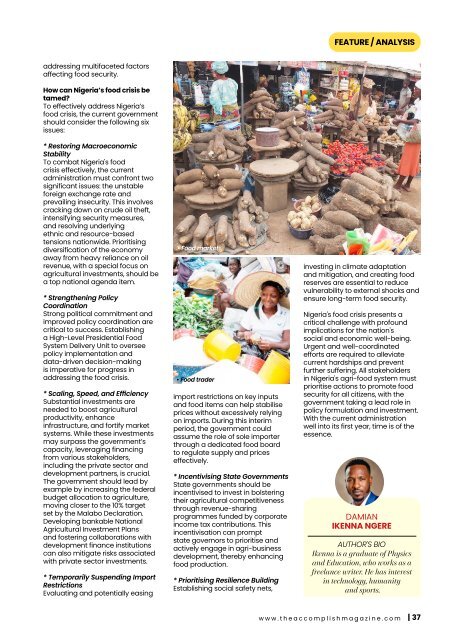ACCOMPLISH MAGAZINE APRIL 2024
April edition with Tomi Davies, Africa's Top Angel, on the cover and other stories.
April edition with Tomi Davies, Africa's Top Angel, on the cover and other stories.
Create successful ePaper yourself
Turn your PDF publications into a flip-book with our unique Google optimized e-Paper software.
FEATURE / ANALYSIS<br />
addressing multifaceted factors<br />
affecting food security.<br />
How can Nigeria’s food crisis be<br />
tamed?<br />
To effectively address Nigeria’s<br />
food crisis, the current government<br />
should consider the following six<br />
issues:<br />
* Restoring Macroeconomic<br />
Stability<br />
To combat Nigeria's food<br />
crisis effectively, the current<br />
administration must confront two<br />
significant issues: the unstable<br />
foreign exchange rate and<br />
prevailing insecurity. This involves<br />
cracking down on crude oil theft,<br />
intensifying security measures,<br />
and resolving underlying<br />
ethnic and resource-based<br />
tensions nationwide. Prioritising<br />
diversification of the economy<br />
away from heavy reliance on oil<br />
revenue, with a special focus on<br />
agricultural investments, should be<br />
a top national agenda item.<br />
* Strengthening Policy<br />
Coordination<br />
Strong political commitment and<br />
improved policy coordination are<br />
critical to success. Establishing<br />
a High-Level Presidential Food<br />
System Delivery Unit to oversee<br />
policy implementation and<br />
data-driven decision-making<br />
is imperative for progress in<br />
addressing the food crisis.<br />
* Scaling, Speed, and Efficiency<br />
Substantial investments are<br />
needed to boost agricultural<br />
productivity, enhance<br />
infrastructure, and fortify market<br />
systems. While these investments<br />
may surpass the government’s<br />
capacity, leveraging financing<br />
from various stakeholders,<br />
including the private sector and<br />
development partners, is crucial.<br />
The government should lead by<br />
example by increasing the federal<br />
budget allocation to agriculture,<br />
moving closer to the 10% target<br />
set by the Malabo Declaration.<br />
Developing bankable National<br />
Agricultural Investment Plans<br />
and fostering collaborations with<br />
development finance institutions<br />
can also mitigate risks associated<br />
with private sector investments.<br />
* Temporarily Suspending Import<br />
Restrictions<br />
Evaluating and potentially easing<br />
• Food market<br />
• Food trader<br />
import restrictions on key inputs<br />
and food items can help stabilise<br />
prices without excessively relying<br />
on imports. During this interim<br />
period, the government could<br />
assume the role of sole importer<br />
through a dedicated food board<br />
to regulate supply and prices<br />
effectively.<br />
* Incentivising State Governments<br />
State governments should be<br />
incentivised to invest in bolstering<br />
their agricultural competitiveness<br />
through revenue-sharing<br />
programmes funded by corporate<br />
income tax contributions. This<br />
incentivisation can prompt<br />
state governors to prioritise and<br />
actively engage in agri-business<br />
development, thereby enhancing<br />
food production.<br />
* Prioritising Resilience Building<br />
Establishing social safety nets,<br />
investing in climate adaptation<br />
and mitigation, and creating food<br />
reserves are essential to reduce<br />
vulnerability to external shocks and<br />
ensure long-term food security.<br />
Nigeria's food crisis presents a<br />
critical challenge with profound<br />
implications for the nation's<br />
social and economic well-being.<br />
Urgent and well-coordinated<br />
efforts are required to alleviate<br />
current hardships and prevent<br />
further suffering. All stakeholders<br />
in Nigeria's agri-food system must<br />
prioritise actions to promote food<br />
security for all citizens, with the<br />
government taking a lead role in<br />
policy formulation and investment.<br />
With the current administration<br />
well into its first year, time is of the<br />
essence.<br />
DAMIAN<br />
IKENNA NGERE<br />
AUTHOR’S BIO<br />
Ikenna is a graduate of Physics<br />
and Education, who works as a<br />
freelance writer. He has interest<br />
in technology, humanity<br />
and sports.<br />
www.theaccomplishmagazine.com<br />
| 37

















